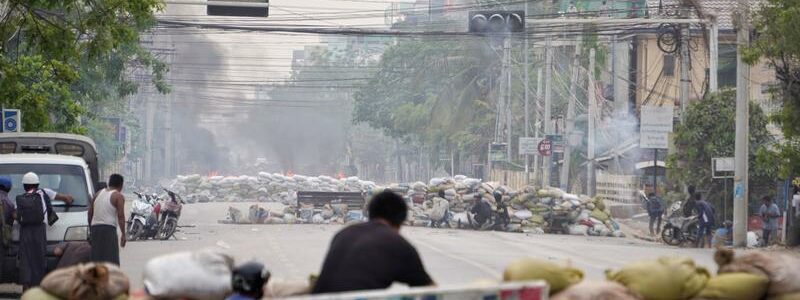
Myanmar activists honk car horns in new protests; neighbours plan diplomacy drive
(Reuters) – Motorists honked car horns in Myanmar biggest city on Monday and planted posters in an empty field in fresh protests against last month’s military coup that ended a decade of tentative democratic reform.
Media reported dawn protests in at least two parts of the commercial hub of Yangon on Monday after hundreds of people in Mandalay, including many medical staff in white coats, marched before sunrise on Sunday.
The Southeast Asian nation has been locked in crisis since the elected government led by Nobel peace laureate Aung San Suu Kyi was overthrown by the military on Feb 1.
At least 250 people have been killed in a harsh crackdown on anti-junta protests, according to figures from the Assistance Association for Political Prisoners activist group.
The violence has forced many citizens to think up novel ways to express their rejection of a return to army rule.
In downtown areas of the commercial capital Yangon, motorists honked car horns in response to a call on social media to mark the one-month anniversary of the launch of one of the biggest demonstrations since the coup.
In the western town of Mindat in Chin state, protesters planted scores of posters in a square in front of the main market saying “Military dictatorship must fail”.
In the latest killings, four people were killed and several wounded in the country’s second city of Mandalay when security forces opened fire after residents tried to resist efforts by the military to set up a base in a school, the Myanmar Now news portal reported.
One man was shot dead and several were wounded when police opened fire on a group setting up a barricade in the central town of Monywa, a doctor there said on Sunday as a community group issued a call on Facebook for blood donors.
“Sniper, sniper,” people can be heard shouting in a video clip shortly after the man was shot in the head in Monywa and more shots rang out.
The spokesman for the junta was not available for comment but has previously said security forces have used force only when necessary.
State media said on Sunday that men on motorcycles attacked a member of the security forces who later died. The military said two policemen were killed in earlier protests.
SOUTHEAST ASIAN DIPLOMATIC PUSH
The junta says a Nov. 8 election won by Suu Kyi’s party was fraudulent, an accusation rejected by the electoral commission. Military leaders have promised a new election but have not set a date.
Western countries have repeatedly condemned the coup and the violence. Asian neighbours, who have for years avoided criticising each other, have also begun speaking out.
In a sign of a new diplomatic push in Southeast Asia, Singapore Foreign Minister Vivian Balakrishnan will visit Brunei Darussalam on Monday before going to Malaysia and Indonesia.
The trip comes as Indonesia and Malaysia seek an urgent high-level meeting of Southeast Asia’s regional grouping, of which Myanmar is a member, on the crisis.
Brunei is currently chair of the 10-member Association of Southeast Asian Nations (ASEAN). A meeting of ASEAN foreign ministers on March 2 failed to make a breakthrough.
Heng Swee Keat, the deputy prime minister of Singapore, told an investors conference on Monday that the crackdown on civilians in Myanmar was appalling.
“Singapore is appalled by the violent crackdowns against civilians,” he said. “It is crucial that all stakeholders in Myanmar come together to find a long term peaceful solution and return to a democratic transition.”
The island-state, which has deep economic ties with Myanmar, has previously called the military action a “national shame”.
The Myanmar military, which sees itself as the sole guardian of national unity and ruled for nearly 50 years after a 1962 coup, has shown no sign of even considering back-tracking on its seizure of power.
Australian media reported that two Australian business consultants were detained as they tried to leave Myanmar, but it was not clear why. An Australian foreign ministry spokesperson said it was providing consular assistance but declined to comment further for privacy reasons.
Sean Turnell, an Australian economic advisor to deposed leader Suu Kyi, was detained last month. The army has not announced any charges against Turnell, who had been advising Suu Kyi on economic policy for several years.
Turnell is among nearly 2,000 people the Assistance Association for Political Prisoners advocacy group says have been detained since the coup
Source: Read Full Article